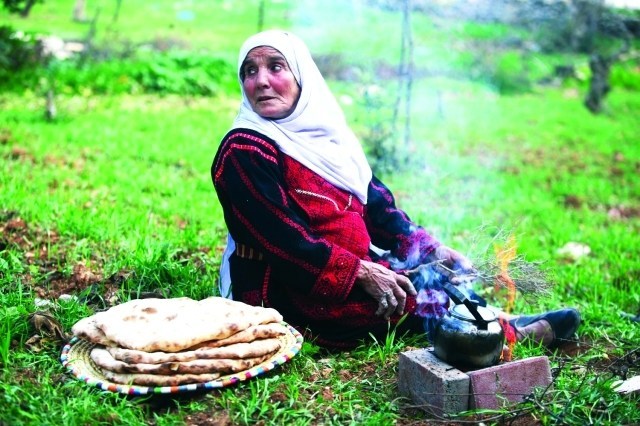AFTER FALAFEL AND HUMMUS, ISRAEL IS TRYING TO APPROPRIATE ZA’ATAR

Many years ago when I was still a student at the University of Haifa, an Arabic television channel organised a debate bringing together Palestinian and Israeli students to discuss political issues. The episode was filmed in the abandoned Wadi Salib of Haifa, a neighbourhood which still yearns every day for its authentic, missing landmarks
One of my Palestinian friends participated in the episode. In the midst of the political debate, the conversation started moving from the pivotal questions of the day onto the most important component of Palestinian identity: food. At this point the discussion started to get heated – for with every Israel’s attempt to erase the building blocks of Arab and Palestinian identity – both its geographical sites and its people – runs a parallel attempt to steal this most distinguishing feature of Palestinian identity. Subsequently, falafel, hummus, tabouleh and other elements of Palestinian and Levant cuisine are marketed as “Israeli food” around the world.
But this argument is ultimately a protracted and continuous one, and so let’s return to my friend’s TV debate: as the political dispute between the two sides reached its zenith, my friend Sayed stood up and directed the following words at one of his Israeli counterparts: “Tell me, does your grandmother know how to make falafel?”
Silence prevailed. And to this very day, we haven’t stopped laughing about the episode. For the question my friend posed was the crux of the daily ‘dispute’ surrounding the identity of falafel, or the spices you should sprinkle atop your hummus. We eat the falafel at our grandmothers’ – because they know how to make the best falafel in the world.
This question strikes at the heart of the divide between those who belong to the falafel or ta’miya (the Egyptian version) kitchen, and those who arrived there as its colonisers. And so of course, as a matter of principle, the Jews of Aleppo and Alexandria own falafel and ta’miya just as much as my grandmother – whether colonialism likes it or not.
I went back to this story after reading an English article titled “What is Za’atar? The Israeli spice that you will want to sprinkle on everything.” The article talks of how prevalent the “unbelievable” za’atar is in Israel, where you can find it (on bread, fish, salad), what spice mixes you can find (sometimes with sesame and sometimes with sumac), and so on and so forth. You could read the article if you want to continue feeling sick.
But in any case, speaking of Israel’s shameless audacity is old news: a weary, age-old subject. Indeed, the very concept of the “culture battle,” at its roots, means that Israel knows full well that culture is the main banner which people rally around. It is the collective identity which makes people feel at home and gives them a sense of belonging – be it to a place, people or thing. Language, like food, are both safe spaces.
Israel was unable to erase the Arabic language from the lives of the Palestinians of Israel. That is, the Palestinians of Israel know Hebrew as a second language; regardless of their relationship with the language, it is one they need to survive and subsist – and one they are proficient in, sometimes using Hebrew words when speaking Arabic. But despite all this, their knowledge of Hebrew did not cancel their usage of Arabic in their daily conversations, in their self-expressions, in their songs at weddings, in their curse-words.
Perhaps the most important thing is the curse-words – that is to say, even the Israelis themselves swear in Arabic – so how can you express the highest feeling of anger in any other language, considering what it offers in linguistic riches and a seemingly-endless assortment of words to choose from?
By Rasha Hilwi
Source: Raseef22

WRITE YOUR COMMENT